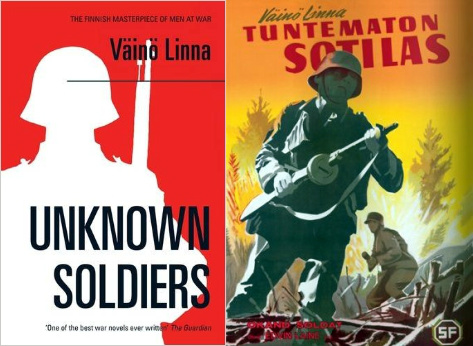In November 1939, the Soviet Union invaded Finland in hopes of annexing Karelia, a strip of forested lands on the border of Finland. It wanted Karelia as a buffer to safeguard nearby Leningrad. Finland fought back fiercely, but ultimately had to surrender portions of its Eastern Lands. Two years later, in June 1941 (when the Nazis broke the Molotov-Ribbentrop pact), Finland was trapped between two authoritarian regimes. Allying itself with Nazi Germany, Finland entered the war against the Soviet Union and attempted to regain the territory lost during the Winter War.
The novel Unknown Soldiers by Vaino Linna presents the morally ambitious events of the Continuation War. The story follows a company of soldiers, some excessively patriotic—and others considerably less so—as they march through the forests of Karelia. The perspective seamlessly switches from character to character, so the reader witnesses the war from multiple perspectives. Despite their differences, each character quickly realizes that the war is horrifying and pointless. The only characters who do not realize this ostensible truth of war are the deluded officers, more concerned about medals and careers than the lives of their men.
As the novel progresses, we learn more about these soldiers, and we begin to feel the same bonds of camaraderie they feel towards each other. There is Koskela, their commander, who does not care about his promotions but only the wellbeing of his men; Lahtinen, the communist, constantly preaching about the proletariat; Rokka, a fast talking insubordinate with the uncanny ability to crack jokes as he takes out enemy machine guns. Linna’s capacity to make these men feel like friends cuts hard when we see the horrors they must endure and the deaths they inevitably face.
Unknown Soldiers is a national novel, read in almost every school in Finland, yet Linna’s nationalism is an absurd and destructive force. At the start of the novel, the soldiers foolishly believe that “Germany was tying up the Russian troops so that it would be easy for the Finns to launch an attack on the entirety of the Soviet Union.” He quickly satirizes this ridiculous viewpoint, interjecting: “so great is the power of megalomania.”
To Linna, war is a universal horror, and nationalism is nothing more than a tool used by the powerful to trick young men into fighting (and ultimately dying) for a country that cares more about its land than their lives. Unknown Soldiers forces English-language readers to reflect not just on Finland’s actions during World War II, but on their misguided patriotism.. In this sense Linna has written a national novel that transcends national borders.
In translation, Linna’s novel takes on greater complexity. Translator Liesl Yamaguchi successfully transfers the uniqueness of each soldier’s dialogue into English. Some characters are country bumpkins who speak with strange accents and talk in circles. Others speak with an arrogance that slowly degrades into sarcasm as the war goes on. One soldier totes a bow and arrow to annoy his superiors, speaking with a ridiculously over-the-top nationalist air. Yamaguchi is even more successful in capturing the sarcasm and cynicism of Linna’s narration. This is how a beloved character dies: “His body shook for a long time as a shower of machine-gun fire tore through it. [The Sergeant] was a happy-go-lucky kind of guy.” The prose is short, direct, and to the point, and Yamaguchi renders it into an English so good it hurts to read.
Unknown Soldiers shows the reader the horror, chaos, and ultimate futility of war. As we watch beloved characters die without cause, and the survivors become increasingly traumatized, we realize intimately the idiocy of fighting for a small strip of land. We also see heroism as nothing more than an instinct to survive: how utterly reprehensible it is to force human beings to confront that instinct. Unknown Soldiers destroys any heroic conception of war we might have, and replaces it with Koskela’s sober realization: “War is no place for a human being.”

